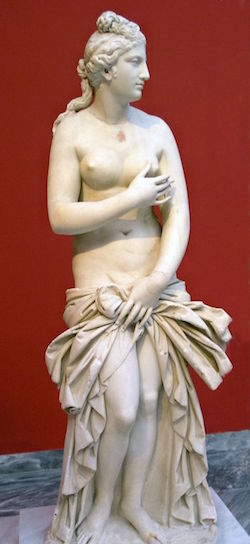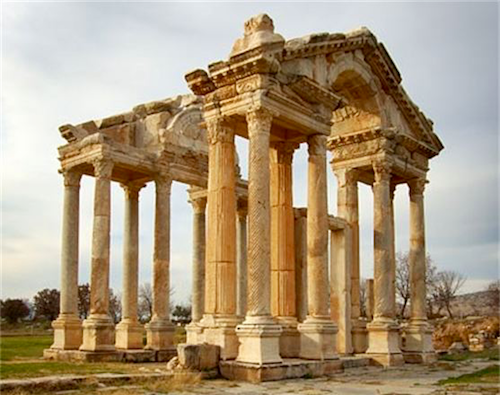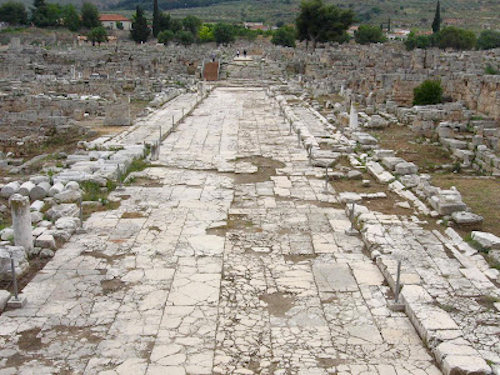Paul the Apostle wrote two letters to the back-slidden Church in Corinth encouraging them, often sarcastically, to get back on the Christian track of good doctrine and good behavior.
CLICK HERE for article on Paul’s Sarcasm

Strabo (c. 63 BC-c. 24 AD), describing Corinth in Paul’s day, said it was a wealthy port city not only because of its fortunate trade location on the isthmus connecting Asia and Italy but:
“…(its) temple of Aphrodite (goddess of love) was so rich that it owned more than 1,000 temple slaves, courtesans, whom both men and women had dedicated to the goddess. And therefore it was also on account of these women (temple prostitutes) that the city was crowded with people and grew rich; for instance, the ship captains freely squandered their money (in the temple brothels) and hence the common proverb: ‘Not for every man is the voyage to Corinth.’” Geography 8.6.20
So notorious for its licentiousness was Corinth that one of the Greek words for “fornication” was korinthiazomai. The American School of Classical Studies in Athens began excavations in Corinth in the late 1800’s and, in addition to uncovering the Agora, a Greek theater and the temple of Apollo, they found a marble lintel of a door on which was inscribed “Synagogue of the Hebrews” (see below). Perhaps it was the same 1st century Corinthian synagogue where Paul “reasoned in the synagogue every Sabbath and persuaded the Jews and the Greeks.” (Acts 18:4)


Paul labored in Corinth for a year and a half trying rather unsuccessfully to stabilize the new church. (Acts 18:11) Pastor Paul passionately pleaded his case and ministry to the Corinthians with words that would not only show his love and vulnerability to them but would sum up his entire ministry:
“We put no stumbling block in anyone’s path, so that our ministry will not be discredited. Rather, as servants of God we commend ourselves in every way: in great endurance; in troubles, hardships and distresses; in beatings, imprisonments and riots; in hard work, sleepless nights and hunger; in purity, understanding, patience and kindness; in the Holy Spirit and in sincere love; in truthful speech and in the power of God; with weapons of righteousness in the right hand and in the left; through glory and dishonor, bad report and good report; genuine, yet regarded as impostors; known, yet regarded as unknown; dying, and yet we live on; beaten and yet not killed; sorrowful, yet always rejoicing; poor, yet making many rich; having nothing, and yet possessing everything. We have spoken freely to you, Corinthians, and opened wide our hearts to you. We are not withholding our affection from you, but you are withholding yours from us. As a fair exchange—I speak as to my children—open wide your hearts also.” II Corinthians 3-13
Some of the believers in that iniquitous city came out of lifestyles and habits that were hard to break. They were constantly backsliding and required constant upbraiding:
“Do you not know that the wicked will not inherit the kingdom of God? Do not be deceived: Neither the sexually immoral nor idolaters nor adulterers nor male prostitutes nor homosexual offenders nor thieves nor the greedy nor drunkards nor slanderers nor swindlers will inherit the kingdom of God. And that is what some of you were.” I Corinthians 6:9, 10


The Corinthians had such calcified and unstable hearts they required two long letters of encouragement and admonishment from Paul. (I and II Corinthians) After Paul was beheaded (c. 64-68), his disciple Clement wrote a very long censorious letter to them filled with correct doctrine and Biblical guides of morality.
Clement’s First Letter to the Corinthians (c. mid-late 1st century) is the oldest surviving Christian document outside of the New Testament.
In spite of all the communications to the Christians in Corinth who had, at first, been faithful to the Gospel and Paul’s love for and agony over the Corinthians and Clement’s long letter to them, the church did not endure.
Excerpts of Clement’s First Letter to the Corinthians: 2:8;-3:1-4
1 Clem 2:8
“Being adorned with a most virtuous and honorable life, ye performed all your duties in the fear of Him. The commandments and the ordinances of the Lord were written on the tablets of your hearts.”
1 Clem 3:1
“All glory and enlargement was given unto you, and that was fulfilled
which is written My beloved ate and drank and was enlarged and waxed fat and kicked.”
1 Clem 3:2
“Hence come jealousy and envy, strife and sedition, persecution and
tumult, war and captivity.”
1 Clem 3:3
“So men were stirred up, the mean against the honorable, the ill reputed against the highly reputed, the foolish against the wise, the
young against the elder.”
1 Clem 3:4
“For this cause righteousness and peace stand aloof, while each man hath forsaken the fear of the Lord and become purblind in the faith of Him, neither walketh in the ordinances of His commandments nor liveth according to that which becometh Christ, but each goeth after the lusts of his evil heart, seeing that they have conceived an unrighteous and ungodly jealousy, through which also death entered into the world.”
The Corinthian believers were stubborn, set in their immoral ways and in those ancient days pushed Paul and Clement away, away, away. — Sandra Sweeny Silver

